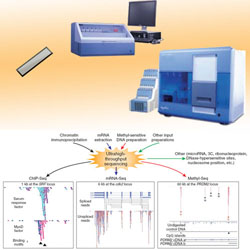Difference between revisions of "Sequencing"
| Line 9: | Line 9: | ||
GTC has two Illumina Genome Analyzers 2.0. Each sequencer can process up to 16 samples per week, with a data yield of 20-30 million reads per sample. Read lengths are 36 to >100 bases in single or paired-end formats. | GTC has two Illumina Genome Analyzers 2.0. Each sequencer can process up to 16 samples per week, with a data yield of 20-30 million reads per sample. Read lengths are 36 to >100 bases in single or paired-end formats. | ||
| − | Templates are “sequenced” by incorporating fluorescently labeled nucleotides | + | Templates are “sequenced” by incorporating fluorescently labeled nucleotides with Illumina's proprietary “Sequencing-By-Synthesis” technology. A detailed description of this process can be found here: http://illumina.com/pages.ilmn?ID=203 |
The system consists of a cluster generation station and a Genome Analyzer, both of which work in concert to generate and analyze flowcells. An overview of the Illumina Genome Analyzer system can be found at the Illumina website: http://illumina.com/pages.ilmn?ID=204 | The system consists of a cluster generation station and a Genome Analyzer, both of which work in concert to generate and analyze flowcells. An overview of the Illumina Genome Analyzer system can be found at the Illumina website: http://illumina.com/pages.ilmn?ID=204 | ||
Revision as of 11:05, 2 July 2010
|
GTC has two Illumina Genome Analyzers 2.0. Each sequencer can process up to 16 samples per week, with a data yield of 20-30 million reads per sample. Read lengths are 36 to >100 bases in single or paired-end formats.
Templates are “sequenced” by incorporating fluorescently labeled nucleotides with Illumina's proprietary “Sequencing-By-Synthesis” technology. A detailed description of this process can be found here: http://illumina.com/pages.ilmn?ID=203
The system consists of a cluster generation station and a Genome Analyzer, both of which work in concert to generate and analyze flowcells. An overview of the Illumina Genome Analyzer system can be found at the Illumina website: http://illumina.com/pages.ilmn?ID=204
Illumina currently provides reagents and support for a five major sequencing applications:
- ChIP Seq
- Small RNA Sequencing
- Digital gene expression
- Genome sequencing and resequencing
- Paired End Sequencing
Other DNA Sequencing applications: The following applications have been published but do not yet have kits from Illumina.
- Genotyping: Protocols are being developed for detection of SNPs, chromosomal rearrangements and other genotyping applications.
- Whole Transcriptome Analysis: Sequencing the entire transcriptome can reveal valuable information about exon boundaries and splice variants that may be missed by microarray analysis or Digital Gene Expression. Kits for whole transcriptome analysis are expected to be available from Illumina soon.
Protocols
Protocols for all of the supported technologies can be found on the Illumina website, or by contacting Illumina at (800) 809-4566. http://illumina.com/pagesnrn.ilmn?ID=70#252
